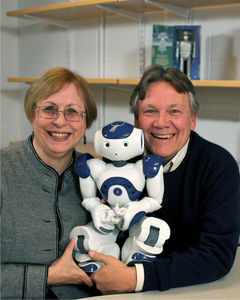Machine Ethics (Talk)
- Michael and Susan Leigh Anderson
We argue that ethically significant behavior of autonomous systems should be guided by explicit ethical principles determined through a consensus of ethicists. Such a consensus is likely to emerge in many areas in which autonomous systems are apt to be deployed and for the actions they are liable to undertake, as we are more likely to agree on how machines ought to treat us than on how human beings ought to treat one another. Given such a consensus, particular cases of ethical dilemmas where ethicists agree on the ethically relevant features and the right course of action can be used to help discover principles needed for ethical guidance of the behavior of autonomous systems. Such principles help ensure the ethical behavior of complex and dynamic systems and further serve as a basis for justification of their actions as well as a control abstraction for managing unanticipated behavior.
Biography: Michael Anderson, professor emeritus of computer science at the University of Hartford, earned his Ph.D. in computer science and engineering at the University of Connecticut. Susan Leigh Anderson, professor emerita of philosophy at the University of Connecticut, earned her Ph.D. in philosophy at the University of California, Los Angeles. They have been instrumental in establishing machine ethics as a bona fide field of study, co-chairing/authoring the AAAI Fall 2005 Symposium on Machine Ethics, a IEEE Intelligent Systems special issue on machine ethics, and an invited article for Artificial Intelligence Magazine on the topic. Further, their research in machine ethics was selected for Innovative Applications of Artificial Intelligence as an emerging application in 2006. Scientific American (Oct. 2010) features an invited article on their research in which the first robot whose behavior is guided by an ethical principle is debuted. They have published "Machine Ethics" with Cambridge University Press (2011).


